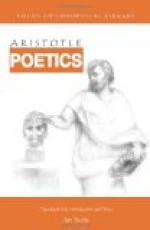A Syllable is a non-significant sound, composed of a mute and a vowel: for GR without A is a syllable, as also with A,—GRA. But the investigation of these differences belongs also to metrical science.
A Connecting word is a non-significant sound, which neither causes nor hinders the union of many sounds into one significant sound; it may be placed at either end or in the middle of a sentence. Or, a non-significant sound, which out of several sounds, each of them significant, is capable of forming one significant sound,—as {alpha mu theta iota}, {pi epsilon rho iota}, and the like. Or, a non-significant sound, which marks the beginning, end, or division of a sentence; such, however, that it cannot correctly stand by itself at the beginning of a sentence, as {mu epsilon nu}, {eta tau omicron iota}, {delta epsilon}.
A Noun is a composite significant sound, not marking time, of which no part is in itself significant: for in double or compound words we do not employ the separate parts as if each were in itself significant. Thus in Theodorus, ‘god-given,’ the {delta omega rho omicron nu} or ‘gift’ is not in itself significant.
A Verb is a composite significant sound, marking time, in which, as in the noun, no part is in itself significant. For ‘man,’ or ‘white’ does not express the idea of ‘when’; but ‘he walks,’ or ‘he has walked’ does connote time, present or past.
Inflexion belongs both to the noun and verb, and expresses either the relation ‘of,’ ‘to,’ or the like; or that of number, whether one or many, as ‘man’ or ’men ’; or the modes or tones in actual delivery, e.g. a question or a command. ‘Did he go?’ and ‘go’ are verbal inflexions of this kind.
A Sentence or Phrase is a composite significant sound, some at least of whose parts are in themselves significant; for not every such group of words consists of verbs and nouns—’the definition of man,’ for example — -but it may dispense even with the verb. Still it will always have some significant part, as ‘in walking,’ or ‘Cleon son of Cleon.’ A sentence or phrase may form a unity in two ways,—either as signifying one thing, or as consisting of several parts linked together. Thus the Iliad is one by the linking together of parts, the definition of man by the unity of the thing signified.]
XXI
Words are of two kinds, simple and double. By simple I mean those composed of non-significant elements, such as {gamma eta}. By double or compound, those composed either of a significant and non-significant element (though within the whole word no element is significant), or of elements that are both significant. A word may likewise be triple, quadruple, or multiple in form, like so many Massilian expressions, e.g. ‘Hermo-caico-xanthus who prayed to Father Zeus>.’
Every word is either current, or strange, or metaphorical, or ornamental, or newly-coined, or lengthened, or contracted, or altered.




